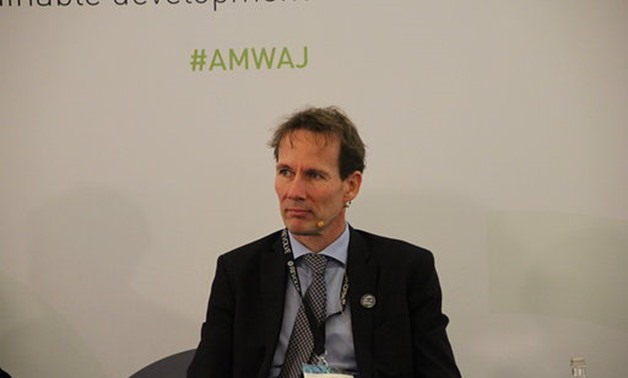
Thomas Van Gilst, head of the Water Management Division within the projects directorate of the EIB - credit of Revolve Water
BARCELONA, Spain – 14 November 2018: Treatment and reuse of wastewater gained widespread international attention in recent years, and are no less important than water security. This has driven many financers, companies and start-ups to consolidate decentralized solutions into their agendas to solve irrigation water shortages, especially in MENA region.
One of the largest financers catering to the wastewater investment sector in the Mediterranean region is the European Investment Bank (EIB). The bank launched its Economic Resilience Initiative (ERI) in support of sustainable growth, under which it will increase the financing of infrastructure projects in Egypt by strengthening its focus on the private sector, including SME support, and expanding partnership with local banks.
Egypt Today talked with Thomas Van Gilst, head of the Water Management Division within the projects directorate of the EIB, about their sanitation-related investments in Egypt and the MENA region, and their financing challenges.
What is the size of your investments in water and sewage projects in Egypt?
The total size of loans for signed projects from 2008 to 2018 is €357,249,000.
Last year, we had at least three projects worth €500 million in loans, a recent one is the €214 million Kitchener Drain project that had the government agreement but not yet the finance contract, which spells out all the details of the project.
We have approval for a major expansion and upgrading project in west Alexandria and this will be negotiated soon as well, and we have been involved in Improved Water and Wastewater Services Programme Upper Egypt (IWSP I) and (IWSP II), which are two other projects that have been going on for a long time. There are more in the pipeline that are being prepared.
How do you assess Egypt’s progress in wastewater projects?
I am really surprised at the amount of investment that is happening now in wastewater treatment; it is a lot. And considering the population density, it is really important that it is taking place.

Minister of Investment Sahar Nasr signs water-related agreements with EIB - courtesy of MIIC
What challenges face water investments in the MENA region?
Simply, to have a strong borrower. Also, to have clarity on who is financing; how tariffs are calculated, who is responsible for what, financing the right project by making sure it is a priority one and not politically advantageous. This whole governance regulation is very important in any country's investment.
What is the timeline of your projects?
Our projects have roughly a five-year implementation period during which the facilities are constructed. We monitor things like procurement, so it has to be advertised internationally. When we make the selection of the contract we justify that they follow exactly the rules that were set out, and that the tender notice is published in the official journal of the EU. There are so large contracts coming from EU countries that can also put in a bid. For example, international consortia in advanced technology providers from Germany can team up with local contractors from Egypt.
What other non-finance assistance do you provide in the MENA region?
We provide technical assistance, so delegations go to the countries and see which projects need support and further developing, and move them forward with studies.
Egypt is one of the few countries that have a list of priority projects and are well organized at the central level; they know what they need to do. We did many technical assistance studies in Egypt. There are strong utilities in Tunisia and Morocco as well, and Jordan has very good long-term strategy, they are thinking far ahead to meet their water needs.

The logo of the European Investment Bank is pictured in the city of Luxembourg, Luxembourg, March 25, 2017. Reuters/Eric Vidal
How long is it before you can confidently hand over projects?
After the implementation period that’s usually when operation starts, and usually the contracts are for wastewater treatment plants or for complex facilities. We remain in for two to three years to train staff, and to make sure everything works properly before the final handover to the local staff.
Basically, after five years, we, as technical people, write a completion report; we write it usually one year after the operation has started. Then we stop following the project and then the whole file becomes just a financial file; it goes to the transaction monitoring department of the bank, and they make sure that the payments are regularly paid. For infrastructure projects, our loans are usually for 20 to 25 years, so this goes on for eternity basically.
Who are your local partners in each country?
In Egypt, we contact the Holding Company for Water and Wastewater (HCWW) as above local utilities, and then in each small area like Kafr el-Sheikh, they have their own utilities, and they report to HCWW. So, our coordination is between the two, but the actual coordination usually happens at the utility level, and the strongest competences are usually central. In many countries, it’s a mix between the two, and it depends on the capacity level of the projects. And we have headquarters in different countries around the world.



Comments
Leave a Comment